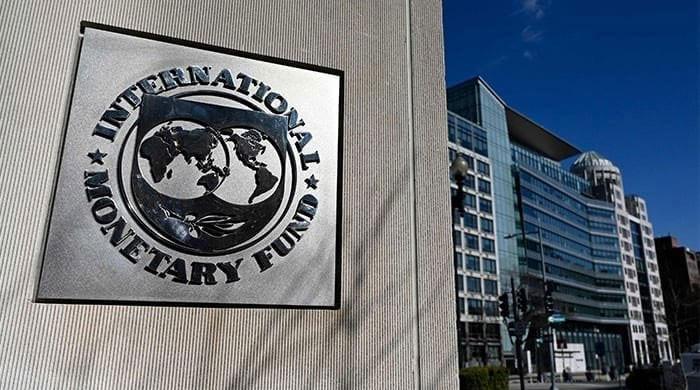- Pakistan aims for a $6 billion IMF bailout in the next three to four weeks.
- Government meets IMF requirements with a challenging budget.
- Public dissatisfaction rises due to new taxation measures.
In a file photo from January 26, 2022, the seal for the International Monetary Fund (IMF) is seen in Washington, DC. — AFP
KARACHI: The Pakistan Muslim League-Nawaz (PML-N)-led coalition government anticipates securing an International Monetary Fund (IMF) bailout exceeding $6 billion within the next three to four weeks, following the fulfillment of all lender requirements in the annual budget. Minister of State for Finance, Revenue, and Power, Ali Pervaiz Malik, shared this optimistic outlook on Wednesday.
The federal budget, presented on June 12, set challenging revenue targets to gain IMF approval for a loan under the medium-term Extended Fund Facility (EFF), aiming to prevent another economic crisis. However, the budget has sparked domestic anger due to new taxation measures.
To meet IMF demands, the government increased taxes on the already burdened salaried class, brought exporters into the normal tax regime, raised the petroleum levy to Rs70, and imposed new taxes on the real estate sector to boost tax collection.
“We hope to culminate this (IMF) process in the next three to four weeks,” Malik told Reuters, aiming for a staff-level agreement before the IMF board recess. He estimated the package to be over $6 billion but emphasized that IMF validation is the primary focus. The IMF did not immediately respond to a request for comment.
Finance Minister Muhammad Aurangzeb expressed optimism about securing the IMF bailout following President Asif Ali Zardari’s approval of the tax-intensive budget for the upcoming fiscal year starting July 1. “The IMF programme is our assurance in terms of macro stability. We are taking it forward; it is inevitable. I’m very optimistic that we’ll be able to take it through the finish line for an Extended Fund Programme which is going to be larger and longer in nature,” the minister said in Islamabad.
Malik stated that the tough and unpopular budget was intended as a stepping stone for the IMF programme, adding that the lender was satisfied with the revenue measures taken. “There are no major issues left to address, now that all major prior actions have been met, the budget being one of them,” he said.
While the budget may gain IMF approval, it could fuel public dissatisfaction, analysts warn. “Obviously they (budget reforms) are burdensome for the local economy but the IMF programme is all about stabilisation,” Malik said.
Economist Sakib Sherani, who heads Macro Economic Insights, noted that a quick IMF deal is crucial to avoid pressure on Pakistan’s foreign exchange reserves and currency. “If it takes longer, then the central bank may be forced to temporarily re-instate import and capital controls,” he said, predicting a period of uncertainty that could impact the rally in equities.





